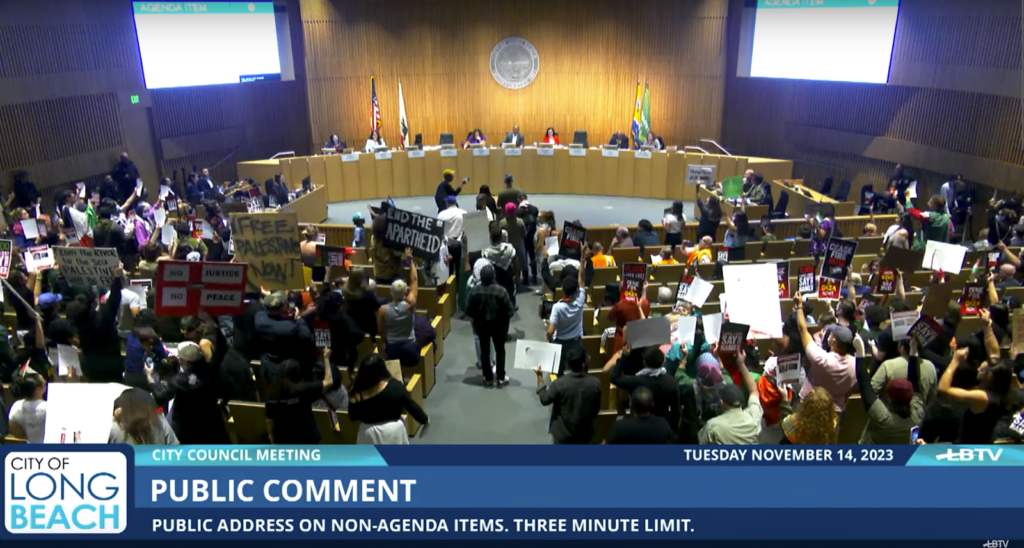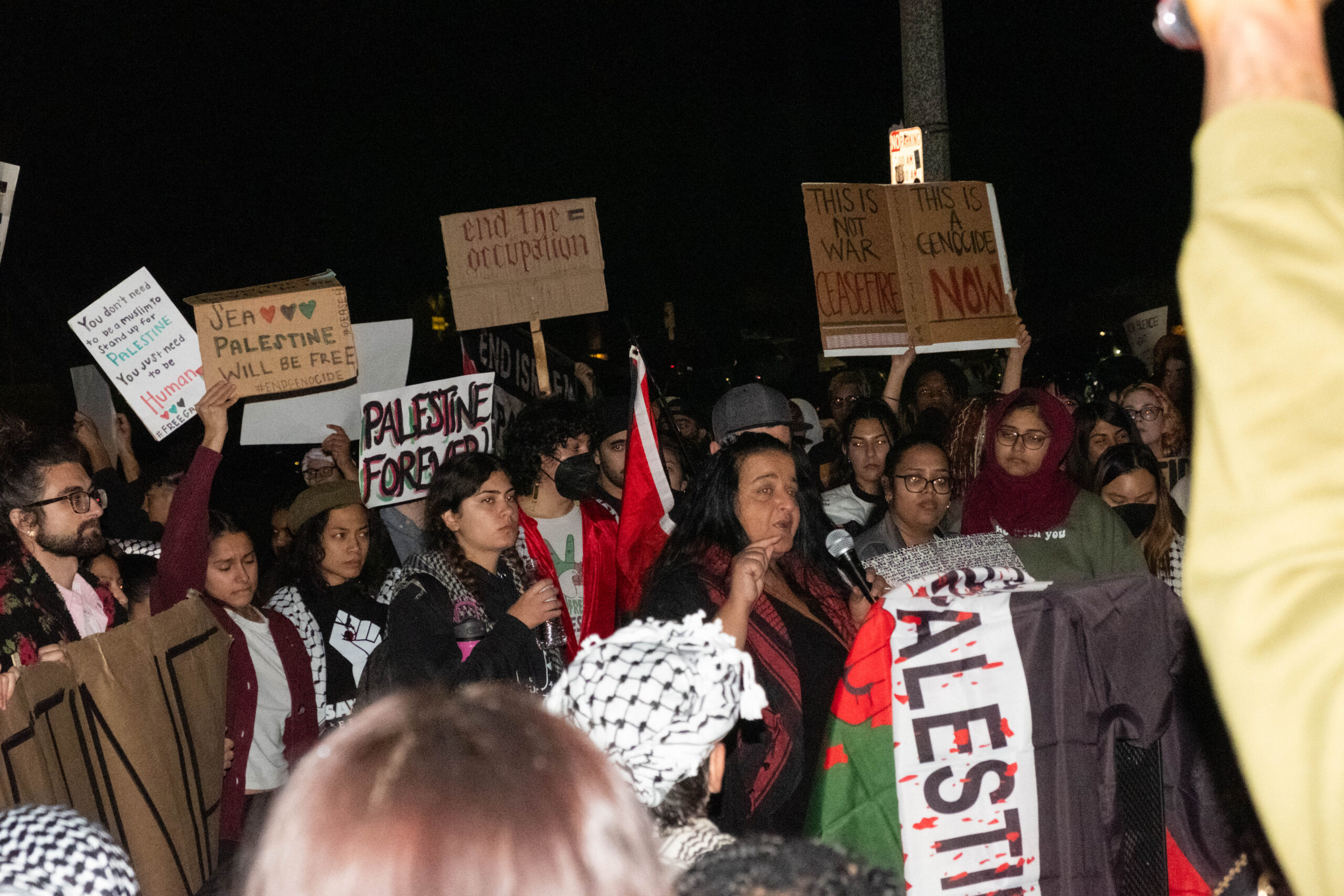Long Beach City Council Has Not Taken Up Ceasefire Resolution Despite Pro-Palestine Protests, Commission Recommendation
10 minute readThe latest pro-Palestine protest in Long Beach gathered outside of City Hall last week before marching into the month’s only regularly scheduled City Council meeting. Protestors holding signs packed the chambers and used the public comment period to demand that the council schedule a special meeting to pass a local resolution endorsing a ceasefire in Gaza and Israel.
“This is about ceasefire versus genocide. This is about the people versus genocide. This is about liberation of all people versus genocide,” said Rida Hamida, a Palestinian activist who spoke at the meeting.
The protest came on the heels of a recommendation to the council from the Long Beach Equity and Human Relations Commission to adopt a local ceasefire resolution, like a handful of other cities around the nation have already done. The resolution would urge the city’s congressional delegation to sign onto the Ceasefire Now Resolution introduced by Rep. Cori Bush in the House last month. So far, only 17 other congressmembers have signed the resolution—with Rep. Barbara Lee of Oakland being the only one from California.
A petition to support the recommendation from the Equity and Human Relations Commission has so far gathered over 1,300 signatures.
Alyssa Gutierrez, the chair of the commission, spoke during last week’s council meeting, saying that as a Jewish woman, she did not believe that condemning Israel’s bombing of Gaza equates to anti-Semitism, pushing for the city to take up the ceasefire stance.
“As elected city leaders, you all may feel very removed from this issue given that we are a city in this big country, but you do have power, your voice has power and you have influence to raise your voice,” Gutierrez said. “Talk to our congressional leaders and use your platform to call for a ceasefire and an end to the mass killing in Palestine.”

Three days later, Rep. Robert Garcia, the city’s former mayor, issued a statement in support of a “lasting ceasefire in Israel and Gaza” contingent on the success of ongoing negotiations to release Israeli hostages being held by Hamas. Garcia’s first public statement in support of a ceasefire, though conditional, came 41 days after the first bomb was dropped on Gaza. Prior to this statement, he had only called for a vaguely defined “humanitarian pause.” Still, Garcia has not signed on to the House’s Ceasefire Now Resolution.
Long Beach’s other congressmember, Rep. Nanette Barragán, has not voiced support for a ceasefire. Both Garcia and Barragán have taken tens of thousands of dollars from the pro-Israel lobby, according to federal campaign finance disclosures.
By far the biggest pro-Israel group, the American Israel Public Affairs Committee (AIPAC), exerts tremendous amounts of power over Congress through the millions it spends to influence elections. This has ensured that support of Israel has been a cornerstone of American foreign policy for decades. Currently, the U.S. provides $3.3 billion of foreign aid to Israel, much of which goes to its military. Established as a settler-colonial ethno-state, Israel continues to serve as an outpost for Western corporations and militaries. President Joe Biden, while a senator in 1986, said that Israel “is the best $3 billion investment we made. Whether or not there was an Israel, the US would have to invent an Israel.” Not much has changed—in October, Biden told Israel’s Prime Minister Benjamin Netanyahu, “I am a Zionist.”
Back at the local level, the response to ceasefire calls from the city’s elected officials has been tepid. Mayor Rex Richardson said during the council meeting that he acknowledged the request for a ceasefire resolution but, per council rules, could not say more since it was not an agendized item. And so far, the council has not scheduled a special meeting to take up a ceasefire resolution.
The mayor did call for an “an immediate ceasefire and de-escalation” in the region on Oct. 8, a day after Hamas killed more than 1,200 people in Israel and took 240 hostages in a surprise attack. Since then, however, neither the mayor nor any member of the City Council have gone on record supporting a “ceasefire.” Meanwhile, Israel’s bombing and invasion of Gaza has killed over 13,000 Palestinians while more than 2,700 remain missing, according to the Palestine Red Crescent Society. The United Nations estimates that 1.6 million Palestinians have been internally displaced in the Gaza Strip. One top UN official called Israel’s attack on Gaza a “textbook genocide” in his resignation letter.
“This is hurting our communities by you not standing with us,” Hamida told the council on Tuesday while calling for a ceasefire resolution. “Please be on the right side of history, protect our communities, protect us from these hate incidents.”
Hamida, who’s the founder of Latino Muslim Unity, said she recently faced harassment for her activism at Cal State Long Beach. She told of an encounter with a student who followed her as she drove away from the university. As she got on the freeway, she said, the student drove up near her vehicle, displayed a photo of her face, and then attempted to run her off the road.
Since Hamas’ attack and Israel’s subsequent bombing of Gaza, there’s been a sharp rise in threats against Arab, Muslim, and Jewish communities nationwide.
One of the goals of the resolution recommended by the Equity and Human Relations Commission would be for the city to “support local programs and services that de-escalate Islamophobia and Anti-Semitism; foster community relations, dialogues centering Palestinian and Jewish voices, and mental health for residents affected by the conflict.”
Tomisin Oluwole
Dine with Me, 2022
Acrylic on canvas
36 x 24 inches
Click here to check out our interview with Tomisin Oluwole, a literary and visual artist based in Long Beach.

Instead of gunking up our site with ads, we use this space to display and promote the work of local artists.
Two other California cities, Cudahy and Richmond, have already passed ceasefire resolutions. Elsewhere, such efforts have elicited contempt from elected officials. In Berkeley, the City Council walked out when protestors interrupted a meeting with ceasefire chants on the same day as the Long Beach protest.
In the weeks leading up to last week’s council meeting, other demonstrations had broken out in and around the downtown area supporting a ceasefire in Palestine and condemning Israel’s assault on Gaza.
At a rally that started at Bluff Park on Nov. 9, a crowd that swelled to over 600 people proceeded to peacefully march through downtown while flying Palestinian flags and holding up signs in support of Palestinian liberation from Israeli military occupation. One sign read “Children are not collateral damage.”
Protestors also chanted the slogan “From the river to the sea.” The decades-old rallying cry has been used by both right-wing Zionists in Israel and Palestinian militant groups to lay claim to the land between the Jordan River and the Mediterranean Sea, where Israel and the Palestinian territories are located. However, the slogan was popularized in the 1960s as a call for the peaceful establishment of an autonomous state for displaced Palestinians. Long Beach protestors echoed that sentiment, ending their chant with a call for peace.
Shirin Senegal, a Palestinian refugee and executive director of the Long Beach non-profit Ronnie’s House, spoke to the crowd about her family’s harrowing survival of the 1948 Nakba, the violent mass eviction of Palestinians from their homeland to create the state of Israel. Senegal said her family’s home was bombed and destroyed in the dispossession. Much of her family is still in Palestine suffering through the current violence.
“My messages all day long on WhatsApp to my cousin consist of me asking if they are alive and if they could check in,” Senegal told protestors. “There are 32 of them now in a house. My other cousin, who I held in my arms as a child in Gaza, is now living and hiding under rubble in a room in my grandfather’s home that’s been in our family for generations. And that’s gone.”
Adam Hijazi, a Palestinian-American activist who had recently marched in the massive pro-Palestinian rally in Washington D.C. that drew over 300,000 people, emphasized the importance of pushing local representatives to make a difference.
“I want to say that our congressional representatives here are extremely connected with what’s happening in the federal government over there [in Washington D.C.],” Hijazi said. “We need the pressure from here all the way to D.C., folks. The two things that these folks care about are voters and money and they need to see us in the streets.”
Among the crowd at Bluff Park was Jordan, a Palestinian-American, who only wanted his first name used. He said his father was a refugee of the 1967 Six-Day War and came to the U.S. with his four brothers and parents.
“We grew up in a world that (we) felt not only silenced us, but didn’t even know we existed,” he said. “So to see protests like these happening, to hear people speaking out for the voiceless, to be able to freely say who I am, and that I am proud to be Palestinian… it is beyond comparison. This was my first time protesting, and it won’t be my last.”
Despite the City Council’s inaction, community members have not given up their calls for a ceasefire. Tanya Kapila, who helped organize the Bluff Park rally, is holding an event at Wood Coffee in Long Beach on Nov. 26 to write emails to representatives in support of a ceasefire.
Outside of Long Beach, SoCal Uprising is organizing a rally and march in downtown Los Angeles on Nov. 25 and another in Lomita on Nov. 27. A protest at Disneyland decrying The Walt Disney Company’s donation of $2 million to Israeli relief groups is scheduled for Dec. 9.
The Palestinian Youth Movement, a grassroots organization with chapters in the the U.S. and Canada, is also calling for a Shut it Down for Palestine on Nov. 24—a global call to boycott commercial activity and protest.
Additional research by Kevin Flores.


 lblaurenbrooks@gmail.com
lblaurenbrooks@gmail.com




